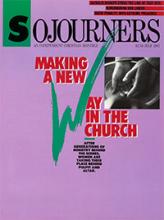"HAVE PATIENCE." KIND AND GENTLE WORDS. Words spoken to encourage--with one light hand on the shoulder, eye meeting eye, a slight and knowing smile--"Have patience." They are words so often spoken to women Baptist ministers looking for a church to serve. They are words usually spoken with the voice of one who is sympathetic to our struggle yet securely employed in our religious institutions, while attaching the extra line: "Church people are just not ready for you women yet. Have patience!"
We should live so long!
Being a female Southern Baptist pastor means being part of an endangered species. Never having been a prolific lot, we now find ourselves even more threatened with extinction as the fundamentalists maneuver to take full control of our denomination.
In 1987 the trustees of our Home Mission Board voted not to provide financial assistance to any church that has a female pastor. The message sent from such an action is clear: Women pastors are unwanted.
Three years ago the Southern Baptist Convention passed a resolution, "On Women," to discourage women from pastoral leadership; the resolution states: "While Paul commends women and men alike in other roles of ministry and service (Titus 2:1-10), he excludes women from pastoral leadership (1 Timothy 2:12) to preserve a submission God requires because man was first in creation and the woman was first in the Edemic fall (1 Timothy 2:13ff.)."
This is certainly not the first time in history that the policy of singling out scripture verses for justification of discriminatory practices has been used. The history of slavery is sad evidence of such ways. Selective reading of scripture to support our own ends is a danger to all of us.
Read the Full Article

